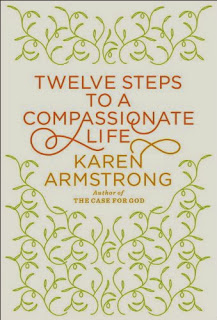“Thousands of people from all over the world contributed to a draft charter on a multilingual website in Hebrew, Arabic, Urdu, Spanish, and English; their comments were presented to the Council of Conscience, a group of notable individuals from six faith traditions (Judaism, Christianity, Islam, Hinduism, Buddhism, and Confucianism) who met in Switzerland in February 2009 to compose the final version.”The charter, which was officially launched Nov. 12, 2009, states that “The principle of compassion lies at the heart of all religious, ethical and spiritual traditions, calling us always to treat all others as we wish to be treated ourselves.”
Each chapter of Armstrong’s book is devoted to one of 12 steps for cultivating and expanding compassion:
- Learn About Compassion
- Look at Your Own World
- Compassion for Yourself
- Empathy
- Mindfulness
- Action
- How Little We Know
- How Should We Speak to One Another?
- Concern for Everybody
- Knowledge
- Recognition
- Love Your Enemies
A person doesn’t have to consider him- or herself “religious” to appreciate this book’s emphasis on the Golden Rule: treating other people as we wish to be treated can have secular value by making interactions more productive. And “In a world in which small groups will increasingly have powers of destruction hitherto confined to the nation-state,” our adoption of the Golden Rule may be vital to our survival.

No comments:
Post a Comment
Robust debate and even unusual opinions are encouraged, but please stay on-topic and be respectful. Comments are subject to review for personal attacks or insults, discriminatory statements, hyperlinks not directly related to the discussion and commercial spam.